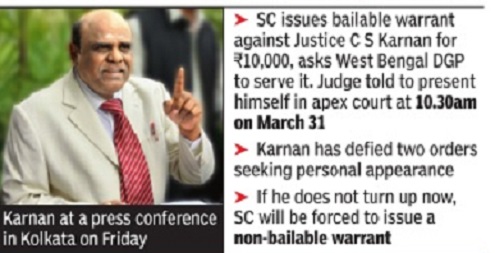Judiciary, superior: India
(→SC asks him to respond in 4 weeks, he denies/ March 2017) |
(→Women judges in the Supreme Court and High Courts) |
||
| Line 275: | Line 275: | ||
[[File: Number of women judges in the Supreme Court and High Courts.jpg|Number of women judges in the Supreme Court and High Courts; [http://epaperbeta.timesofindia.com/Article.aspx?eid=31808&articlexml=STATOISTICS-ONE-WOMAN-JUDGE-IN-SUPREME-COURT-ONLY-28122016009038 ''The Times of India''], Dec 28, 2016|frame|500px]] | [[File: Number of women judges in the Supreme Court and High Courts.jpg|Number of women judges in the Supreme Court and High Courts; [http://epaperbeta.timesofindia.com/Article.aspx?eid=31808&articlexml=STATOISTICS-ONE-WOMAN-JUDGE-IN-SUPREME-COURT-ONLY-28122016009038 ''The Times of India''], Dec 28, 2016|frame|500px]] | ||
| + | |||
| + | ==2017: Lady CJs in Bombay, Calcutta, Delhi, Madras HCs == | ||
| + | [http://epaperbeta.timesofindia.com/Article.aspx?eid=31808&articlexml=GUEST-EDITORS-PICK-In-a-1st-women-judges-08042017031012 Dhananjay Mahapatra, April 8, 2017: The Times of India] | ||
| + | |||
| + | '''But Account For Only 10% Of 632 Justices''' | ||
| + | |||
| + | In the male-dominated world of higher judiciary, there is a silver lining -women now head the four major and oldest high courts in Mumbai, Delhi, Kolkata and Chennai. | ||
| + | |||
| + | With the appointment of Indira Banerjee as chief justice of the Madras HC on March 31, women created history by heading the four historical HCs, which were among the first few created in colonial India. Madras HC has six women judges, inclu ding the chief justice, while there are 53 male judges. | ||
| + | |||
| + | Bombay HC is headed by Justice Manjula Chellur, who first headed an HC on September 26, 2012. She became Bombay HC chief justice on August 22 last year. Incidentally, Bombay HC has the highest number of women judges, 11, against 61male judges.The number two in the HC is also a woman, Justice V M Tahilramani. Delhi HC has been headed by Justice G Rohini since April 13, 2014. The HC has nine women judges and 35 male judges. Here too, the number two is a woman, Justice Gita Mittal. Calcutta HC has been headed by acting chief justice Nishita Nirmal Mhatre since December 1 last year. But this HC has a poorer women-tomen-judge ratio -4 to 35. | ||
| + | |||
| + | Among the 632 HC judges in 24 HCs, there are only 68 women judges, a mere 10.7%.There is just one woman judge, R Banumathi, among 28 judges in the Supreme Court. | ||
=Salaries, allowances= | =Salaries, allowances= | ||
Revision as of 23:44, 21 May 2017
This is a collection of articles archived for the excellence of their content. Readers will be able to edit existing articles and post new articles directly |
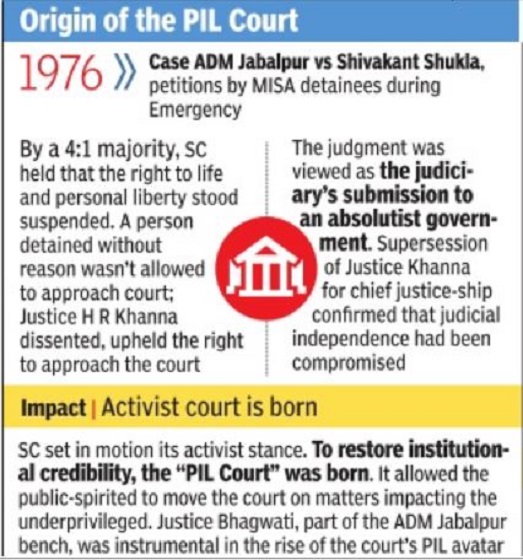
The Times of India
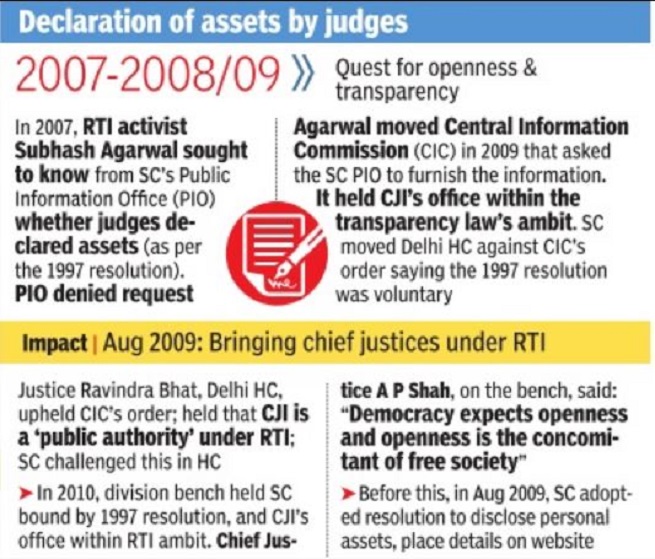
The Times of India
Contents |
Contempt charges against judges
1992: Justice V Ramaswami
A quarter century ago, the Supreme Court was faced with an NGO's plea seeking initiation of contempt of court proceedings against sitting SC judge Justice V Ramaswami. The NGO had accused him of writing letters, in which he made “sweeping allegations“ against judges who were part of a committee inquiring against him but the court refused to entertain the request.
An inquiry panel headed by Justice P B Sawant was set up by Parliament in consultation with the then CJI after a motion for Justice Ramaswami's removal was introduced in the House. While the inquiry was on, Justice Ramaswami wrote a letter on January 21, 1992 making “sweeping allegations against certain judges and the judiciary“. In a subsequent letter on March 28, he explained the context in which he had written the earlier letter. The panel held Justice Ramaswami “guilty of wilful and gross misuse of office, purposeful and persistence negligence in discharge of duties, moral turpitude by using public funds for private purposes in diverse ways and reckless disregard of statutory rules which brings to disrepute high judicial office and dishonour to the institution of judiciary and undermines the faith and confidence which public reposes in administration of justice“.
The Parliament then took up the motion for his removal as SC judge, the first of its kind in the country . But the motion, which required two-thirds votes of MPs present, fell through in 1993 as Congress MPs abstained from voting. However, then CJI Sabya sachi Mukherjee withdrew judicial work from Justice Ramaswami. No direction was ever issued by a higher court stripping a sitting judge of judicial and administrative work as done by the SC in the case of Justice C S Karnan. In a petition filed in 1992, NGO `Sub-committee on Judicial Accountability' had requested the SC to initiate suo motu contempt proceedings against Justice Ramaswami for writing the January letter. A bench of then CJ M N Venkatachalliah and Justice A M Ahmadi and Justice Kuldip Singh declined to entertain the plea. It observed, “We feel that a lot of misunderstanding could have been avoided if the letter had not been written. We are unhappy that it came to be written. We while expressing our unhappiness about the episode, however, think we should decline in the larger interest to suo motu institute any proceedings for contempt against Justice V Ramaswami.“
2017/ Justice C S Karnan: defies superior authorities
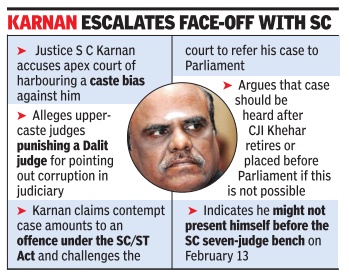

In an unprecedented step, Chief Justice of India J S Khehar decided on Tuesday to initiate contempt of court proceedings against sitting Calcutta high court judge C S Karnan for continuously levelling allegations against the Madras HC chief justice and other judges.
The SC has listed the contempt proceedings for Wednesday and the case will be heard by a bench headed by the CJI and comprising six other senior judges -Dipak Misra, J Chelameswar, Ranjan Gogoi, Madan B Lokur, P C Ghose and Kurian Joseph.
This is the first time that a Constitution bench has initiated contempt of court proceedings against a judge of the SC or HC. There have been times when the CJI, after receiving inquiry reports against a sitting judge, has recommended to Parliament to ini tiate proceedings for the removal of the erring judge.
Karnan had plunged Madras HC into a crisis in 2015 by threatening contempt proceedings against Chief Justice Sanjay K Kaul. Karnan had accused Kaul of interfering in his judicial work and sought a CBI probe into the alle ged forged educational qualification of another HC judge.
The controversial judge has also alleged that he was a victim of caste bias as he was a Dalit and had accused the Madras HC chief justice of harassing him. Subsequently , when he was transferred, Karnan “stayed“ the order of the SC, advising the CJI not to interfere in his “jurisdiction“, before relenting and accepting his transfer. The outcome of the proceeding against the judge is keenly awaited. If the apex court finds the judge guilty of contempt, will it punish him and send him to jail? If he is found guilty and sent to jail, will he automatically lose his job as HC judge or will the bench make a recommendation to Parliament for his removal? Constitutionally , the only proc ess for sacking a judge of the SC or HC is through a removal motion passed by a two-thirds majority in each House of Parliament. Till date, no judge has been removed by Parliament though such motions were initiated thrice. The caste angle to the case also threatens to generate a controversy if matters reach Parliament. A removal motion against Justice V Ramaswami was defeated in Parliament in May 1993 with the help of abstaining Congress MPs. Sikkim HC Chief Justice P D Dinakaran resigned in July 2011 ahead of the initiation of a removal motion against him in the Rajya Sabha. Justice Soumitra Sen of the Calcutta HC argued his case unsuccessfully before the RS which passed the motion for his removal, but Sen resigned before the Lok Sabha could take up the motion.
Karnan had also threatened to ask the National Commission for Scheduled Castes to initiate a detailed inquiry against the HC chief justice for harassing him, a Dalit, and also slapping a case against the chief justice under stringent provisions of the SCST Atrocities (Prevention) Act. The HC had rushed to the SC, accusing Karnan of judicial indiscipline. The SC had on May 11, 2015 restrained Karnan from initiating any action against the chief justice. But Karnan continued his diatribe against the CJ and other judges and kept writing letters to the PM and the CJI and circulated the letters among advocates. Exasperated, the SC had advised the President to transfer him to Calcutta HC.
SC divests Justice Karnan of duties
Dhananjay Mahapatra, SC summons Karnan, clips his wings, Feb 09 2017: The Times of India
Seven-Judge Bench Strips Him Of Duties, Asks Him To Hand In Judicial Files To HC
In an unprecedented step, a bench of seven seniormost Supreme Court judges on Wednesday asked Calcutta high court's Justice Chinnasamy Swaminathan Karnan to be present in the SC on February 13 and explain why he should not face contempt of court proceedings.
In a sombre, 25-minute hearing held in pin drop silence in a jam-packed courtroom, a bench of CJI J S Khehar and Justices Dipak Misra, J Chelameswar, Ranjan Gogoi, Madan Lokur, P C Ghose and Kurian Joseph issued notice to Karnan and asked him to appear and explain whether a series of letters levelling “scurrilous“ allegations against sitting and retired SC and HC judges were indeed written by him and if so, why contempt of court proceedings be not drawn against him. Pending contempt procee dings, the bench took another unprecedented step of stripping Karnan of all judicial and administrative work. “Justice Karnan shall forthwith refra in from handling any judicial or administrative work as may've been assigned to him as a consequence of the position held by him. He is also directed to return all judicial and administrative files in his possession to the Calcutta HC registrar general,“ it ordered.
Though the unparalleled step was taken by top judicial brains on the SC bench, they were aware of the unchartered path ahead. “We will be seeking assistance from the bar at a larger level -what we can do and what we cannot. What should be the punishment? If punished (for contempt), should he remain in office? These issues are of vital importance.We have to be and we should be very careful,“ the court said.
Proceedings before the Constitution bench started on Wednesday with attorney general Mukul Rohatgi making a 20-minute presentation on the constitutional crisis triggered by Karnan's allegations. Rohatgi said this was a case where facts, existence of letters authored by Karnan, were not in any doubt. “These are open communications. Nature of allegations are disparaging and scurrilous, which are very mild words to describe the charges he has made against sitting and retired judges. It brings the administration of justice to complete disrepute. This court must set an example and it will make citizens aware that the SC will not hesitate to take action against anyone who brings administration of justice to disrepute even if the person is an HC judge,“ he said.
CJI Khehar said the signature on the letters appeared to be of Karnan. “Let him come before us and decide whether he owns up authorship of the letters. If he denies, then it will change the entire scenario,“ the CJI said, indicating that this could require a thorough inquiry . Rohatgi requested the court to direct the Calcutta HC chief justice not to allo cate judicial work to Karnan till he purged himself of contempt charges. “Add to the order that if Justice Karnan writes any more similar letters, it will aggravate the contempt charges,“ the AG said.
But the court refused and said it was a request based on presumption. The SC also said it would not direct the HC CJ to withdraw work from Karnan. “Ordinarily , the SC never directs the HC CJ, we only request him. But why put the HC CJ to trouble when we can do it. We will neither direct nor request the CJ. We will do it ourselves,“ the bench said.
Selected to be a judge of Madras HC by the collegium headed by then CJI K G Balakrishnan in 2008, Karnan was born on June 12, 1955 in Karnatham village Tamil Nadu's Cuddalore district. His father had secured the President's award for being a good teacher. He passed law from Madras Law College in 1983.
Justice Karnan demands Rs 14cr relief from SC
Facing arrest warrant for defying Supreme Court orders in a contempt case against him, Calcutta High Court's Justice C S Karnan has passed a suo motu order, despite being divested by the SC of judicial powers, directing the CJI and six senior-most SC judges to pay him Rs 14 crore in compensation.
He also ordered the CBI to probe and report to Parliament on his complaint of corruption against 20 sitting and retired SC and HC judges. The allegations were construed as contempt by CJI J S Khehar, leading to setting up of the seven-judge bench which initiated contempt proceedings against him. The SC had issued bailable arrest warrant against him on March 10 while ordering his production before the court on March 31 as Justice Karnan twice defied the SC summons seek ing his presence to carry forward the proceedings.
Ignoring the se rious consequenc es, Justice Karnan, ordered to be divested of both judicial and administrative work by the SC, passed an order on Wednesday and followed it with a letter to the seven judges on Thursday . In Wednesday's order, Justice Karnan directed the CBI to conduct a thorough probe into his corruption charges against the 20 judges and said material to substantiate his allegations was available with Madras HC. More seriously , he ordered the seven judges on the bench headed by the CJI to pay him a compensation of Rs 14 crore for ruining his reputation. “The seven judges have prevented me in carrying out my judicial and administrative works from February 8 till now. Therefore, I am calling upon all seven judges to pay compensation, a sum of Rs 14 crore as compensation since you disturbed my mind and my normal life, besides you have insulted me in the general public due to lack of legal knowledge,“ he said.
He also asked them to pay the compensation within seven days.Justice Karnan further muddied the waters by firing off a fresh letter addressed to the seven judges informing that their interim orders were null and void.
SC asks him to respond in 4 weeks, he denies/ March 2017
Dhananjay Mahapatra, Mar 31, 2017, The Times of India
'Respond in 4 weeks on contempt charges', SC tells Justice Karnan; he says he will not unless his work is restored to him
HIGHLIGHTS
Justice Karnan also dared the SC to punish him again saying he won't appear again unless his judicial work is restored.
The SC believed Justice Karnan 'is not able to comprehend what exactly he is doing'.
Attorney General Mukul Rohatgi said that he was perfectly aware of what he's doing
NEW DELHI: The Supreme Court today directed Kolkata high court's Justice CS Karnan+ to respond to defamation charges+ in four weeks, and when he said he wouldn't unless his judicial work is restored to him, the court asked him if he was mentally fit. "If you feel you are not mentally fit to answer the queries of court, you give us a medical certificate," said Chief Justice JS Khehar to the Kolkata judge who's facing contempt proceedings for making allegations of bias against Madras High Court colleagues as well as against the Supreme Court. As the SC bench rose to leave, Justice Karnan+ loudly declaimed that he wouldn't again appear before the top court. It was unclear whether he would 'never' appear in the SC or would never appear in the SC 'on this matter'. The Kolkata Judge then told the media that he's going to "pass an order against" the seven-judge SC bench hearing his case. Just before that, Justice Karnan also dared the SC to punish him again saying he won't appear again unless his judicial work is restored.
The apex court refused to agree to restore the Kolkata judge's judicial work to him and told him he's free to engage a lawyer to defend himself. Justice Khehar asked him more than once if "is mentally fit to understand the gravity of the contempt proceedings."
During the hearing Attorney General (AG) Mukul Rohatgi said that Justice Karnan was perfectly aware of what he was saying and doing.
The Chief Justice however told the AG "we can see his (Justice Karnan) state of mind is not clear and he is not able to comprehend what exactly he is doing." Earlier this month, the SC had issued a bailable warrant against Justice Karnan to secure his presence in the court on the next date of hearing, which is today, March 31. That was the first and so far only time that a sitting judge of the higher judiciary faced contempt proceedings and the apex court has been forced to issue a warrant against a judge.
Karnan summons CJI, 6 judges
Justice Karnan summons CJI Khehar, 6 SC judges to his ‘home court’, Apr 14, 2017, The Times of India
HIGHLIGHTS
Justice C S Karnan of the Calcutta HC passed an order asking the SC judges to appear at his residential court in Kolkata.
A seven-judge constitutional bench had issued a bailable arrest warrant against Justice Karnan.
In a move probably unprecedented in the country's legal history, Justice C S Karnan of the Calcutta high court said on Thursday that he has passed an order asking Chief Justice of India J S Khehar and six other judges of the Supreme Court to appear before him at his residential court in Kolkata on April 28.
CJI Khehar and the six other judges had earlier initiated contempt proceedings+ against Justice Karnan and summoned him to appear before them on March 31. The seven-judge constitutional bench had also issued a bailable arrest warrant against Justice Karnan.
Justice Karnan. "On 28.04.2017 at 11.30am, the Hon'ble seven judges as mentioned above will appear before me at my Rosedale Residential Court and give their views regarding quantum of punishment for the violation of the Scheduled Castes and Scheduled Tribes Atrocities Act," Justice Karnan told reporters.
The 'suo motu judicial order' was passed from his residence which, the judge said, has now become his "makeshift court at Rosedale, New Town, Kolkata - 700160". Justice Karnan also told reporters that the seven judges comprising the bench that initiated contempt proceedings against him insulted him "wantonly and deliberately and with mala fide intention".
In his signed order, Justice Karnan has stated that on March 31 he had "pronounced a judgement wherein the Hon'ble seven judges are accused under the Scheduled Castes and Scheduled Tribes Atrocities Act, 1989. Justice Karnan's order further states that the CJI had raised a question regarding his mental health on March 31 and this was endorsed by the six other judges in the bench. The seven judges had insulted him by raising this question in the the open apex court, Justice Karnan claimed.
Karnan claimed. "The CJI also mentioned to me that I am not having a clear mind, hence the suo motu contempt proceeding is being adjourned for four weeks so I may clear my mind. This is an additional big insult to me in the open apex court and the same was endorsed by the six other Hon'ble judges," Justice Karnan added.
This extraordinary tussle had started a few months ago after Justice Karnan had written letters to the CJI and Prime Minister, alleging that seven high court judges were corrupt. This had prompted the Supreme Court to initiate contempt proceedings against him.
After Justice Karnan spoke out against this, his judicial and administrative powers were withdrawn and he was asked to appear before the constitutional bench. When he refused to comply, the Supreme Court issued that warrant and directed the director general of police, West Bengal to execute it to ensure Justice Karnan's presence before the bench on March 31.
Justice Karnan did appear before the constitutional bench on March 31 but reiterated his charges against the seven judges. He also sought restoration of his judicial and administrative powers which wasn't granted.
Disciplinary issues
SC orders warrant against sitting HC judge
Court Rejects Karnan's Plea To Meet CJI
The Supreme Court took a stern view on Friday of Calcutta high court judge C S Karnan defying its direction to present himself in court and, in an unprecedented decision, issued a bailable warrant aga inst the serving judge. Karnan's presence is required in the SC as he is facing contempt proceedings for levelling allegations against the SC and his former colleagues in the Madras high court.
The court rejected a request from Karnan to meet the Chief Justice and senior judges of the SC, noting that it could not be treated as a response to the notice issued to him. It also saw reports that the judge was passing orders from his house as a “prank“.
A seven-judge bench hea ded by Chief Justice J S Khehar decided it had had eno ugh of Karnan's defiant ways and acted tough as he refused to comply with two SC orders seeking his personal appearance despite a notice being served on him.
The court said it was left with no option but to issue a warrant against him to secure his presence in the court on the next date of hearing on March 31. This is the first time that a sitting judge of the higher judiciary is facing contempt proceedings and the apex court has been forced to issue a warrant against a judge. Karnan has consistently claimed that he is a victim of caste bias and ac cused his colleagues of discriminating against him. He has claimed that the proceedings against him are vitiated by the same sentiment.
Attorney general Mukul Rohatgi told the bench, also including Justices Dipak Misra, J Chelameswar, Ranjan Gogoi, Madan B Lokur, P C Ghose and Kurian Joseph, that Karnan had refused to mend his ways and there is no let-up in his contemptuous behaviour as he recently passed an order against the SC order on the “suicide note“ of former Arunachal Pradesh chief minister Kalikho Pul in which allegations were levelled against certain judges.
The AG said he had talked to the registrar general of the Calcutta high court, who confirmed that the order was passed by Karnan at his home but it was not sent to HC.
The bench, however, refused to take note of the incident, saying it might be a “prank“, but decided to lean on the judge. It issued a bailable warrant on a personal bond of Rs 10,000 and asked the West Bengal DGP to serve it to the judge.
The CJI said that Karnan had sought a meeting with him and fellow judges to dis cuss the allegations levelled by him but it could not be accepted as his response to the court's notice.
“It would be pertinent to mention that the registry of this court received a fax message from Justice C S Karnan, dated March 8, seeking a meeting with the Chief Justice and the judges of this court, so as to discuss certain administrative issues expressed therein, which primarily seem to reflect the allegations levelled by him against certain named judges. The above fax message cannot be considered as a response of Justice Karnan, either to the contempt petition, or to the notice served upon him,“ the bench said.
“In view of the above, there is no other alternative but to seek the presence of Justice C S Karnan by issuing bailable warrants. Ordered accordingly . Bailable warrants in the sum of Rs 10,000 in the nature of a personal bond to the satisfaction of the arresting officer be issued to ensure the presence of Justice Karnan in this court on March 31 at 10.30am,“ the bench said in its order after holding a brief 15-minute hearing.
The apex court will have no option but to issue a nonbailable warrant against Karnan if he fails to appear on March 31.
Justice Karnan orders cases against CJI, SC judges
Karnan orders cases against CJI, SC judges Mar 11 2017 : The Times of India (Delhi)
Karnan orders cases against CJI, six SC judges & attorney general
Calcutta HC judge C S Karnan held a “court“ session at his residence within hours of the SC issuing a bailable warrant and “ordered“ that a case be registered under the SCST Act against CJI J S Khehar, other SC judges on the bench and AG Mukul Rohatgi. He also issued an “order“ directing the CBI to register and investigate cases against a host of judges from various courts for alleged corruption, rape and embezzlement.
He argued that it was an unprecedented move to hold court in this manner but added that “if the law keepers of the country have taken an unpreced ented route to malign me, I've the power to take an unprecedented route to fight back“.
On February 8, 2017, the SC had stripped Karnan of all judicial and administrative work and asked him to personally appear in court on February 13 to explain why contempt action should not be initiated against him for improper conduct and intemperate remarks.
Karnan observed that no contempt action, either civil or criminal, can be initiated against a sitting HC judge under Sections 2(c), 12 and 14 of the Contempt of Courts Act or under Article 20 of the Constitution. “Only a motion of impeachment can be initiated against a sitting judge of the higher judiciary before the Parliament after due enquiry under the Judges' Enquiry Act“. He added, “The SC shares equal power and rights with all the HCs of the country . It is not my master and I am not its servant. I will not appear before the SC.“
High Court judgments
Karnataka: Quashing circulars issued by CJ
From the archives of The Times of India 2010
HC quashes three circulars issued by CJ Dinakaran
Karnataka HC has struck down three circulars issued by its Chief Justice P D Dinakaran against whom allegations of land-grabbing have been raised. The first circular that was quashed by a division bench, comprising Justice N Kumar and Justice Srinivasagowda yesterday, concerned the Chief Justice’s power to hear cases filed by employees of high court and judicial officers against his administrative decisions.
The second circular that was struck down related to the sitting Chief Justice’s jurisdiction in deciding which circuit bench should hear a particular case.
The judgement paves the way for litigants in north Karnataka to approach the principal bench directly, which they could not do earlier. According to the first circular, cases by court employees and judicial officers challenging the Chief Jutice’s orders were posted to hall one, where the CJ sits.
Allowing a petition filed by M S Poojari, a peon in the high court, the court said the circular cleared the way for CJ to be a judge in a case where he is also the litigant.
Calcutta: Judge changes mind, and order
The Times of India, June 8, 2016
Subrata Chattora Calcutta high court was witness to a wrangling match between two judges in the courtroom perhaps never seen since its inception in 1862.The spat was over a change made in the order delivered earlier in open court by one of the judges. The senior judge of the division bench even offered to resign after coming to know about the alteration, saying that making such changes without informing him was illegal. A division bench of justice Ashim Kumar Roy and C SKarnan had on May 20 turned down the bail petitions moved by IVRCL senior general manager Mallikarjun Rao and nine others accused in the Vivekananda Flyover collapse case. They have been in jail since April 1after being remanded by a lower court. Justice Karnan had a change of mind more than a fortnight after he had agreed with his senior, Justice Roy, in turning down the bail appli cation. According to Justice Roy , the other judge retired to his chamber on Monday afternoon without taking leave from his senior and made amends to the bail rejection order. While striking off his agreement, Justice Karnan took a contrary stance and held that all of the accused should be granted bail.
The senior judge lost his calm when he got to know about the change. On Tuesday , Justice Roy stopped in front of the judge's seat and asked Justice Karnan to sit first. “You take the seat first because you broke decorum yesterday by leaving the courtroom,“ Justice Roy said.
Justice Karnan was courteous and requested the senior to take seat. “Please take your seat first,“ he said. According HC sources, Justice Roy later called on Chief Justice Manjula Chellur and told her about the incident.
Meghalaya: Sr lawyer tag for former CJs, judges
Dhananjay Mahapatra, Sr lawyer tag for former CJs, judges, Sep 13 2016 : The Times of India
Meghalaya HC's Controversial Ex-CJ Uma Nath Singh Leads SC List Of 26
Even as senior advocate Indira Jaising's petition questioning the rationale behind designating some lawyers as senior advocates in April last year remains pending, the Supreme Court on Monday said it had designated 26 former chief justices and judges of high courts as senior advocates.
First on the list of freshly designated senior advocates is former Meghalaya HC chief justice Uma Nath Singh.There are two petitions pending in the SC challenging decisions of the HC headed by Justice Singh.
The first petition by Shillong Bar Association questioned the rationale behind a decision by the Meghalaya HC headed by Justice Singh to designate Delhi-based la wyers as senior advocates.The SC entertained this petition in January and issued a notice to the Meghalaya HC registrar general.
The second petition by a common man from Meghalaya challenged the retirementeve orders by a bench headed by Justice Singh, directing the state to provide him with `Z' category security even after retirement and treat him as a guest of the state whenever he visited Delhi and Shillong. The SC has kept this petition in abeyance after Meg halaya said it would challenge these orders.
Former judges of Allahabad HC -Satish Chandra, Ravindra Singh, Sunil Hali and Virendra Vikram Singh -were designated as seniors at the SC's full court meeting on August 31.
Other retired judges to get the senior advocate tag are Asim K Banerjee (Calcutta HC), K C Bhanu and P Chandra Kumar (AP and Telangana HC), Anil Kumar, Kailash Gambhir and J M Malik (Delhi HC), Subhash Chandra Jha, Dharnidhar Jha and V N Sinha (Patna HC), K C Puri, Arvind Kumar, B B Parsoon and S D Anand (Punjab and Haryana HC), B D Rathi and Sambhoo Singh (MP HC), Kamal Mehta (Gujarat HC), A K Rajan (Madras HC), Hasnnain Massodi (J&K HC), V R Kingaonkar (Bombay HC) and I M Quddushi (Chhattisgarh HC).
The SC did not designate a single lawyer as senior advocate since its decision on April 23 last year was challenged by Indira Jaising, the first woman additional solicitor general who represented the government during the UPA regime. The SC had entertained her petition in July last year .
The court had said, “We are aware of the problem. All is not well. But let us assure you that there is no intention to deny a deserving candidate or confer it on an undeserving lawyer.“ It had explained why the SC had changed the procedure for designating a lawyer as senior advocate from open house to secret ballot in 2014.
“There were times when judges found it difficult to object to some names. So, it was felt that they could express themselves without reservation through secret ballot,“ it had said.
Jaising had said, “There is no criteria laid down for determining excellence in advocacy and no rational nexus between the persons designated and their excellence or no rational reason for rejection of persons of eminence and ability .
“This has resulted in denial of designation of those advocates who have domain expertise in matter such as PIL, human rights, family law, international law and other specialised subjects.“
Judges' security
Meghalaya CJ, Laloo cases
The Times of India, Sep 06 2016
Dhananjay Mahapatra
Aam aadmi has no say in ex-judges' security, says SC
After evaluating the threat perception of former Meghalaya high court chief justice Umanath Singh, central security agencies found no perceptible security threat to him, who in his last days as CJ had suo motu ordered `Z' category cover for himself even after retirement. Three orders passed in December and January by an HC bench headed by Singh was challenged by a common man, Sajay Laloo, in the Supreme Court, which has openly expressed dislike towards common citizens questioning security for retired judges.
During the last hearing, an SC bench headed by Chief Justice of India T S Thakur had virtually stopped Laloo's counsel, senior advocate Vijay Hansaria, from arguing the matter. It had asked central agencies to evaluate the threat perception of the retired CJ and send the inputs to the Meghalaya government.
Central agencies told the state that incidents cited by the former CJ as cause for apprehension to his security were not serious, indicating that there was no need for `Z' category security cover. In between, Meghalaya's counsel Ranjan Mukherjee had requested the court for in-chamber hearing of the issue because of its sensitivity . This was stridently opposed by Hansaria.
Hansaria had barely started arguments that the bench headed by Thakur snapped at him and asked him to sit down. “This is a matter between the judiciary and the Meghalaya government. A common man has no say in this,“ the bench said.
Though slighted by the bench, an unfazed Hansaria questioned the bench's perception about a common man's locus standi in questioning unreasonable orders passed suo motu by an HC bench.
But the bench told him to “sit down“ and clarified it would hear only the Centre and Meghalaya. Hansaria walked out of the court saying, “If that is the case, then I would rather go out. Let the court decide what it wants.“
Additional solicitor general Maninder Singh told the court that central agencies had evaluated the security requirement of the ex-CJ and sent the inputs to the state.
The bench, which was initially inviting the counsel for a chamber hearing, chided the Meghalaya government for not challenging such orders and, thus, giving an opening to “interlopers“ to jump into the fray with PILs.
“Stand upfront and say these are wrong orders and challenge them in the Supreme Court. Because the state government did not challenge these orders, it has given fodder to the common man to challenge it in the SC,“ the bench said. Meghalaya's counsel assured the court that the state would challenge the orders within three weeks.
Women judges in the Supreme Court and High Courts
Please see graphic
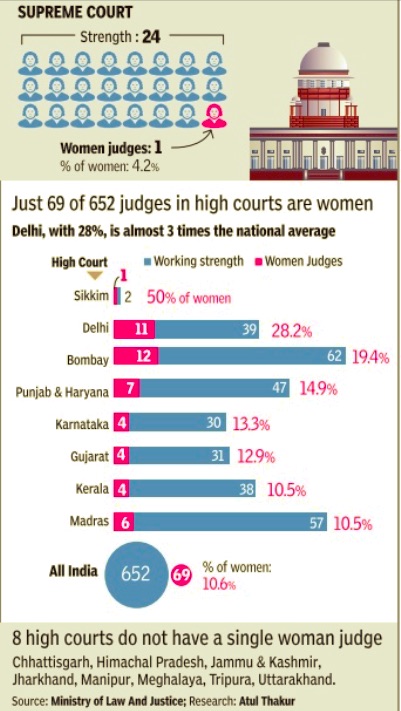
2017: Lady CJs in Bombay, Calcutta, Delhi, Madras HCs
Dhananjay Mahapatra, April 8, 2017: The Times of India
But Account For Only 10% Of 632 Justices
In the male-dominated world of higher judiciary, there is a silver lining -women now head the four major and oldest high courts in Mumbai, Delhi, Kolkata and Chennai.
With the appointment of Indira Banerjee as chief justice of the Madras HC on March 31, women created history by heading the four historical HCs, which were among the first few created in colonial India. Madras HC has six women judges, inclu ding the chief justice, while there are 53 male judges.
Bombay HC is headed by Justice Manjula Chellur, who first headed an HC on September 26, 2012. She became Bombay HC chief justice on August 22 last year. Incidentally, Bombay HC has the highest number of women judges, 11, against 61male judges.The number two in the HC is also a woman, Justice V M Tahilramani. Delhi HC has been headed by Justice G Rohini since April 13, 2014. The HC has nine women judges and 35 male judges. Here too, the number two is a woman, Justice Gita Mittal. Calcutta HC has been headed by acting chief justice Nishita Nirmal Mhatre since December 1 last year. But this HC has a poorer women-tomen-judge ratio -4 to 35.
Among the 632 HC judges in 24 HCs, there are only 68 women judges, a mere 10.7%.There is just one woman judge, R Banumathi, among 28 judges in the Supreme Court.
Salaries, allowances
2017
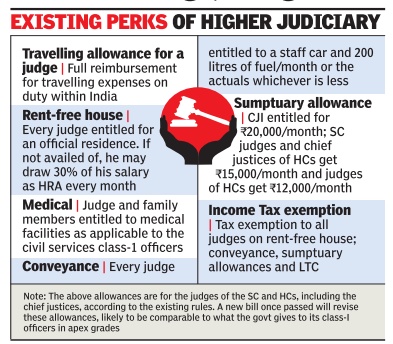
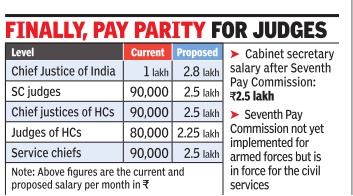
The government has accepted the Supreme Court proposal for raising emoluments given to judges of the apex court and high courts, commensurate with the recent hike in pay for central government staff.
The Chief Justice of India (CJI) is the highest-paid functionary in the judiciary with his current monthly emoluments at Rs 1 lakh, excluding dearness and other allowances. This is likely to be raised to Rs 2.8 lakh, in addition to perks such as official residence, cars, staff and allowances as applicable. The government has pegged the salaries of the chief justices of HCs and SC judges at Rs 2.5 lakh per month, in addition to allowances, at the level of the Cabinet secretary, the service chiefs and some constitutional functionaries such as the CAG and the CEC.The salary of an HC judge has been pegged at Rs 2.25 lakh a month, same as that of secretary-level officers in the central government. The hikes proposed by the Supreme Court committee have not been accepted in full. The three-judge panel had recommended a salary of over Rs 3 lakh per month for the CJI, besides other perks. The government has set the salary for the CJI at Rs 2.8 lakh per month, a little above what the cabinet secretary draws.
The judges' panel had also recommended a higher pension benefit for retiring judges. This again has been brought to the Seventh Pay Commission level in an equivalent grade.A three-judge committee had given its recommendations to the government a few months ago with regard to salary hikes for judges. The recommendations were submitted soon after the implementation of the Seventh Pay Commission recommendations for central employees in 2016.
A Cabinet note has been prepared and may be approved by the Union Cabinet soon, sources said. After the Cabinet clears the proposal, the law minister will bring a related judges' salary amendment bill before Parliament. Any change in judges' salary and service condition has to be passed by Parliament. The salaries of judges of the high courts and the Supreme Court are revised every 10 years, almost on the lines of the hikes given to senior government functionaries.
See also
Supreme Court: India (mainly SC's rulings)
Supreme Court, India: Administrative issues
Supreme Court: India: Chief Justices
Supreme Court: India: Sitting judges
Judicial appointments, senior: India mainly the Collegium debate
Judiciary: India (powers, functions)
Judiciary, superior: India
